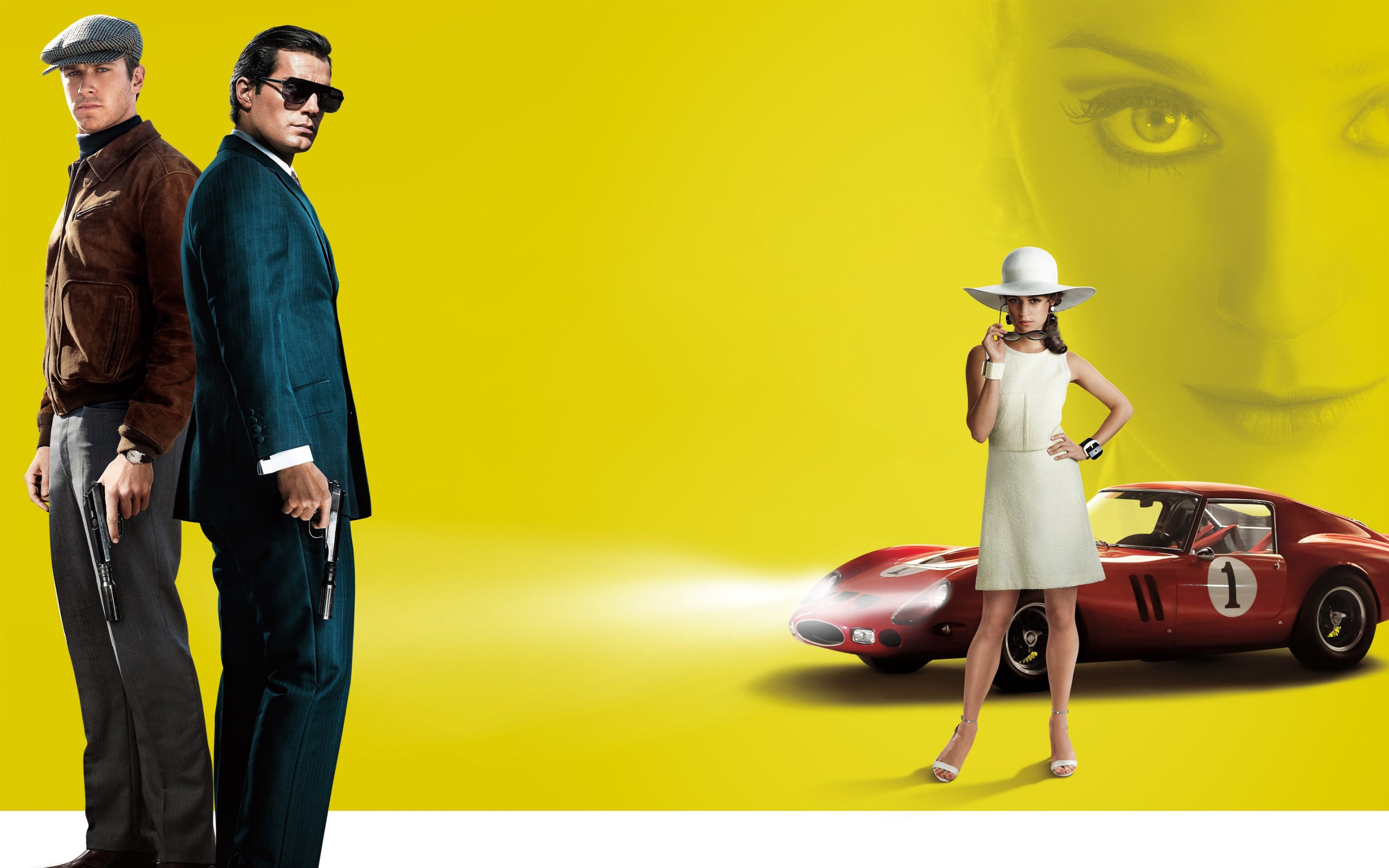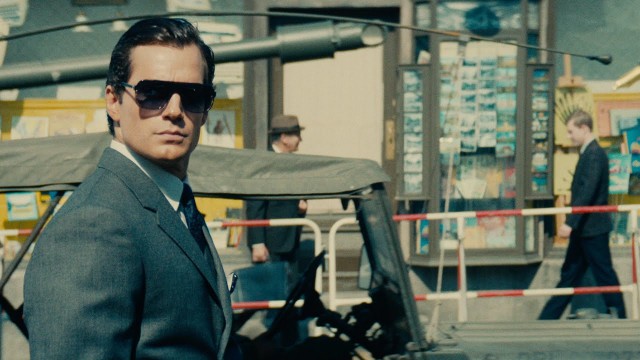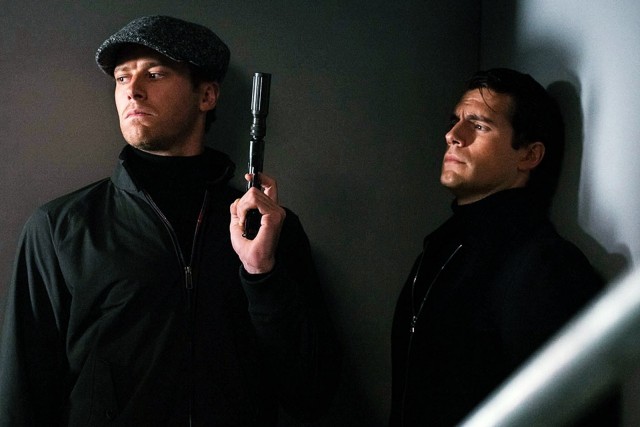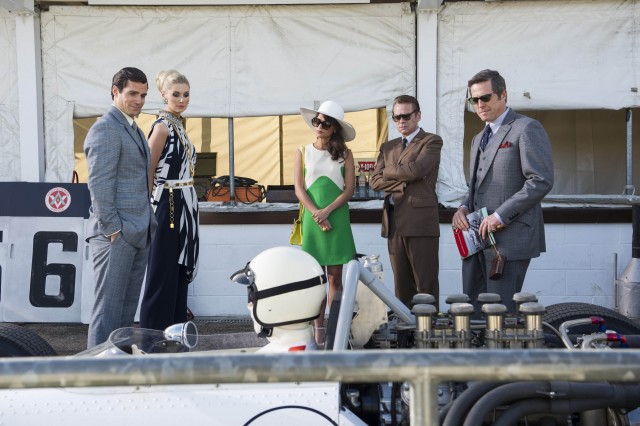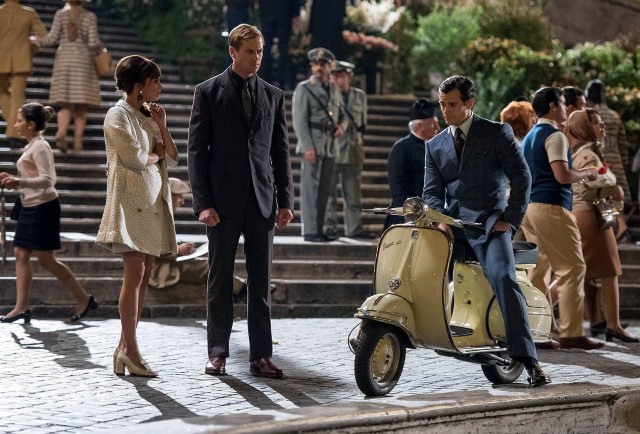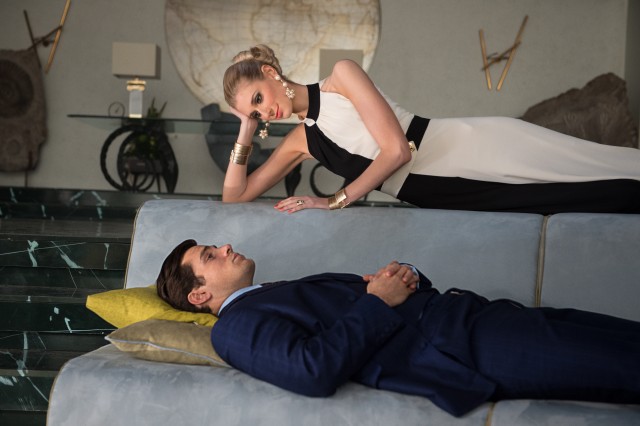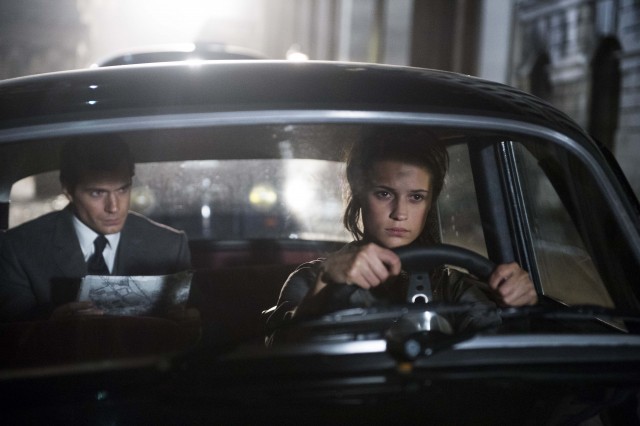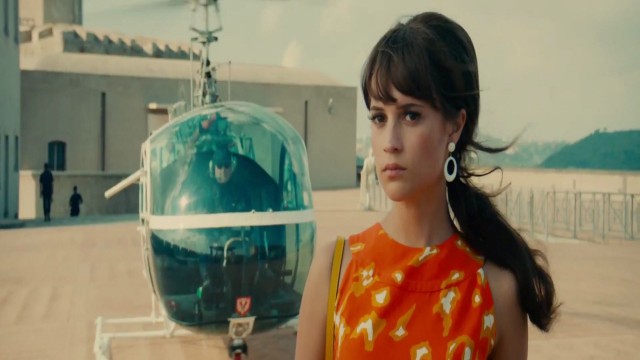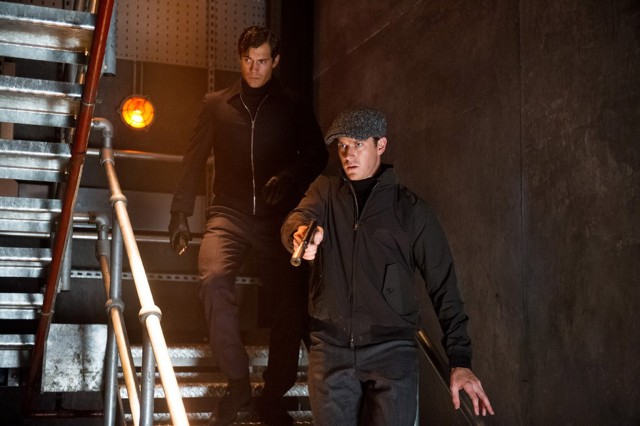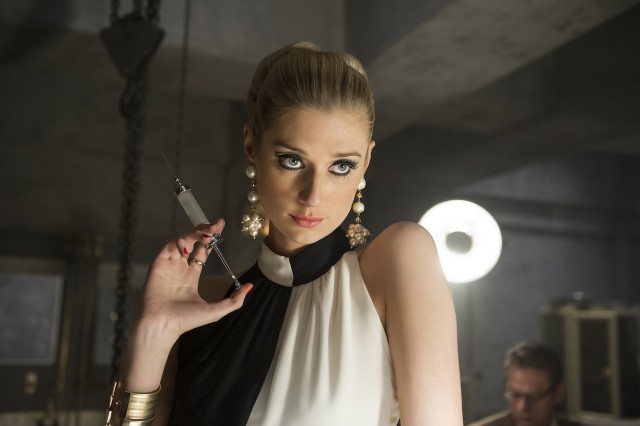Even director, Guy Ritchie’s weakest movies have a very infectious rhythm to them. They’re so lively and charming that it’s easy to forgive even Ritchie’s most dubious flops, let alone the ease with which one can praise his true masterpieces, namely his breakout efforts, Lock, Stock and Two Smoking Barrels and Snatch. Ritchie also proved that he knows his way around mainstream blockbusters as well, with 2009’s impressive Robert Downey Jr. vehicle, Sherlock Holmes, and its surprisingly great sequel in 2011, Sherlock Holmes: A Game of Shadows.
Since Sherlock Holmes: A Game of Shadows however, Ritchie has stayed out of the directors’ chair, until now, that is. After a hiatus from directing, Ritchie is back with another hopeful franchise starter for Warner Bros. to follow his duology of Sherlock Holmes movies, that being TV-to-film adaptation, The Man from U.N.C.L.E. Running from 1964 to 1968, The Man from U.N.C.L.E. came from the height of the 1960’s spy media boom, which also saw Get Smart and Mission: Impossible dominating television, while a humble British character called James Bond first started revolutionizing the movie industry. Set amidst a backdrop of Cold War politics, The Man from U.N.C.L.E. is a proud product of its time, which is why the movie adaptation not even bothering to modernize itself is a smart decision.
For all of its joie de vivre and slick, classy wardrobe however, The Man from U.N.C.L.E. is sadly wrapped around a rather boilerplate spy tale, with only its Odd Couple-esque pairing of a CIA agent and a KGB agent to separate itself from the pack, along with that reliable Guy Ritchie charm, of course. The movie is acceptable on its own merits, but it sadly drops in a banner year for spy movies, following the hilarious mayhem of Kingsman: The Secret Service, the sharp, thrilling wit of Spy, and the highly exciting, action-packed Mission: Impossible – Rogue Nation. When stacked against those movies, and with the looming presence of the next James Bond movie, Spectre releasing in November, The Man from U.N.C.L.E. sadly feels like the weak link in the big screen spy game of 2015, and the movie that audiences are most likely to forget shortly after seeing it.
There’s still plenty to like about The Man from U.N.C.L.E. though, which feels stylish and classy, and well-presented enough to get by, making even 2015’s weak link in spy movies nonetheless turn out an enjoyable popcorn flick. It’s the very definition of a Summer wind-down flick though, ultimately lacking the punch of a real blockbuster, and gradually trying to get audiences used to more perfunctory genre offerings again, as we prepare to enter the grim wasteland of September and the rather spotty minefield of October.
The TV show had only two leads, which worked for the fictional spy organization, U.N.C.L.E., an acronym for “United Network Command for Law Enforcement.” Said leads were CIA agent, Napoleon Solo, and KGB agent, Illya Kuryakin, who had to put aside their Cold War era differences and work together to stop villains across the globe. These villains mostly came in the form of counterspy organization, T.H.R.U.S.H., which is absent from the movie adaptation. 1960’s spy media villains were almost always shadowy super-villain organizations with convenient and laughably unrealistic acronyms back then, unless of course you were Mission: Impossible, in which case you had the exact same thing, only then operating under the more straightforward name of ‘The Syndicate’.
With T.H.R.U.S.H. out of the picture in the movie, we are instead given the progressive, enterprising wife of a playboy tycoon, Victoria Vinciguerra to serve as our main villain, played by Elizabeth Debicki. Debicki’s steely villainess has all of the cold-hearted class of any legacy Bond villain, with Debicki playing her as a ruthlessly efficient socialite that effectively hides in plain sight. It’s just too bad that Victoria’s grand plot feels so ill-defined and underwhelming. She’s going to great lengths to secure herself a Uranium-enriched nuclear weapon for… Reasons. The movie never truly elaborates beyond that, and we’re just supposed to take her at face value, which might have been effective enough in the 1960’s, when nuclear paranoia ruled the public consciousness, but in 2015, Victoria sadly feels like an undercooked antagonist, despite Debicki’s effective performance.
But what of our heroes? Well, Henry Cavill’s Napoleon Solo feels like a cross-breeding between James Bond and John McClane, being a smooth-talking wisecracker with a dubious past as a slippery art thief, and a reputation as a loose cannon who would rather be anywhere than where he is. Cavill’s charm is effective, but he feels like a caricature of his inspirations, bedding random women throughout the movie for absolutely no reason, and somehow being trusted by the CIA completely, despite the fact that he’s a known criminal with a tendency of acting against common sense. Again, this might have made perfect sense for a spy hero in the 1960’s, but in 2015, the movie wisely plays off Solo’s unbelievable personality as a source of humour, which Cavill thankfully goes with nicely, even if it’s not playing to his strengths as an actor.
Speaking of playing against type, Armie Hammer is also delivering a very different performance than usual, as the stoic, quiet KGB bruiser, Illya Kuryakin. Kuryakin has a tortured past and a hidden emotional side that Solo prods at continually, which thankfully helps to explain how a ruthlessly effective KGB agent might get so bent out of shape at the American prick he’s been assigned to work with. Hammer manages to find wit and humour in a character that otherwise feels dark and tortured, fortunately backed up nicely by Ritchie’s own script, a collaboration between the director and Lionel Wigram. He’s still playing against type though, and like Cavill, this gives him serviceable chemistry as a foil, but both lead actors sometimes feel hamstrung by the demands of their performances. It definitely feels like The Man from U.N.C.L.E. is most concerned with capturing looks over depth, with Cavill’s and Hammer’s characters looking the parts of their former TV incarnations, but not quite capturing the same level of depth.
Fortunately, the plucky Alicia Vikander, who already dazzled at the movies earlier this year with her brilliant breakout turn in dark horse sci-fi hit, Ex Machina, steals the show right from under the men. Vikander’s no-nonsense tomboy mechanic, Gabby Teller feels like she’s most thriving on The Man from U.N.C.L.E.’s simultaneous celebration and satire of 1960’s spy convention. Vikander charges into her role right from the beginning with incredible energy, being a force that’s never to be underestimated, and never degrading into a damsel-in-distress, despite her character being the plot device that originally forces Solo and Kuryakin to work together, when they both have to babysit her to get to her father, the lead scientist building Victoria’s nuke, while also keeping tabs on the other agent.
Sadly, you ultimately see very little of the handlers behind the operation, including Hugh Grant, who is supposed to be playing Solo’s and Kuryakin’s boss from the TV series, Alexander Waverly. Grant has had a drastically diminished presence on the big screen lately, with his most recent well-known role being as the pirate captain in an animated movie, The Pirates!: Band of Misfits from Aardman and Sony. The role of Waverly is his biggest live-action role in quite some time, which is why it’s a shame that we don’t see more of him. Grant’s incredibly charming delivery makes him a personality that would have provided a nice neutral presence to the incessant pissing contest between Solo and Kuryakin, but the movie barely makes him any more than an Easter Egg for fans of the TV show, even though he also serves as a sequel bait device to lead in to the credits. This is still better than Jared Harris as Solo’s CIA handler, Saunders however, reuniting with Guy Ritchie after portraying villain, Moriarty in Sherlock Holmes: A Game of Shadows, who is given absolutely nothing to work with beyond being a small, thankless exposition device that’s barely in the movie.
Surprisingly, the female leads seem to have ended up with better material and performances than the male leads, including Cavill and Hammer. Cavill and Hammer are a satisfactory duo, but they definitely feel like a downgrade from the more effective pairing of Robert Downey Jr. and Jude Law from Ritchie’s Sherlock Holmes movies. They’re not without their charm, but this buddy action-comedy recipe has been done better by Ritchie himself in several of his prior works.
Like I said, if you’ve seen almost any bit of spy media, especially from the time period, you can guess just about every turn in The Man from U.N.C.L.E. in advance. There’s one or two solid twists in the script, but the main plot unfolds about exactly the way you expect it would, especially with such a by-the-numbers villain plot behind it all.
At the very least, the movie starts out strong, and it does do a good job of setting up its leads, and in the case of Solo and Kuryakin, their animosity. A well-choreographed intro makes sure that these professionals are not simply at odds over national politics, which might have made them feel like brainless thugs, but rather, two highly inconvenienced professionals who are desperate to prove that their way is better.
There’s a boyish sense of mischief throughout the plot of The Man from U.N.C.L.E., and that’s where most of the movie’s entertainment value comes from. You could probably care less about whatever else is going on, which sadly falls on the weaker end of Guy Ritchie-directed stories, in that The Man from U.N.C.L.E. sports a rather boilerplate premise that somehow feels very over-explained. Ritchie loves dialogue, and dialogue is often one of his key strengths as both a writer and a director, but in a less well-realized Ritchie vehicle, the dialogue becomes tedious and needlessly tangled, and that’s when happens when The Man from U.N.C.L.E. foolishly tries to act more creative and subversive than it actually is.
Fortunately, the movie’s overly familiar spy trappings are nonetheless easy to sit through, thanks to a well-realized sense of humour, and a whole lot of charming presentation. It wouldn’t be unfair to accuse The Man from U.N.C.L.E. of being style-over-substance, but at least it’s not difficult to watch, if you’re in the mood for a reliable, entertaining spy flick.
Guy Ritchie feels like the perfect choice to direct a movie like The Man from U.N.C.L.E., which feels like an effective throwback to the earlier days of spy media, while also allowing Ritchie to bring some of his blockbuster sensibilities from his two Sherlock Holmes movies to the table. It feels like a cross-pollination of ideas that makes The Man from U.N.C.L.E. feel like an effective marriage between the old and the new, even if that would have been more potent, had the movie’s plot been a little more inspired.
Fortunately, Ritchie’s direction is still an absolute delight here. Action scenes feel understated, but engaging, and the movie proceeds as something stylish in its own right, even when it shirks the bombastic production values of many modern action blockbusters. Likewise, Ritchie’s attention to period detail is excellent, with The Man from U.N.C.L.E. being packed with sexy retro chic locations, and arguably one of the best instances of stylish Hollywood wardrobe work from this entire Summer movie lineup, alongside Warner Bros.’ own Mad Max: Fury Road, which was a brilliant work of wardrobe art for the opposite reasons as the suave and sophisticated The Man from U.N.C.L.E.
Unfortunately though, Ritchie’s touch doesn’t seem to fit well with the rather lacklustre IMAX cut of The Man from U.N.C.L.E. The IMAX cut of the movie feels poorly-optimized for IMAX screens, and doesn’t quite manage the necessary sense of scale to feel like anything more than a cash grab. Likewise, the action scenes, while well-choreographed, are not common enough to justify the added power of the IMAX speakers, which ultimately makes seeing The Man from U.N.C.L.E. in IMAX feel like a sadly underwhelming experience. You’re better off saving the cash and just sticking with a regular digital screening.
Guy Ritchie has certainly directed better movies than this one, even with his two recent Sherlock Holmes offerings. but The Man from U.N.C.L.E. does feel polished and entertaining, even if not that remarkable in the end. Still, Ritchie is one of the largest forces when it comes to making The Man from U.N.C.L.E. enjoyable, since its chipper confidence feels engaging, even when the plot foundation is anything but.
Another element of The Man from U.N.C.L.E. that deserves high praise, among the highest one can offer the movie, is the soundtrack by Daniel Pemberton, which is the most outstanding part of it. The 1960’s spy chic musical score feels like a very delectable retro treat, making The Man from U.N.C.L.E. feel both fun and classy. It’s a very nice break from the same tired bombastic blockbuster orchestra, giving The Man from U.N.C.L.E. a sense of suave professionalism, on top of making it a very effective throwback to the former heyday of spy media, which now seems to be having a sort of mini-renaissance in 2015.
The rest of the audio is also quite effective, even if it’s not that much improved in an IMAX showing versus a regular digital showing. Nonetheless, the smaller-scale, more intimate scraps, usually between Solo and Kuryakin, feel like an effective switch from the more large-scale set pieces in Kingsman: The Secret Service and Mission: Impossible – Rogue Nation, with The Man from U.N.C.L.E. packing a sense of mischievous abandon, even if it doesn’t quite manage the scale of this year’s other high-profile spy movies.
Still, there’s a lot of care put into making a swinging soundtrack that prioritizes fun and sex appeal above all else, making for a playful spy movie that doesn’t take itself too seriously, and isn’t afraid to have fun with an era that many older viewers will look back on with a sense of amused nostalgia. Even younger viewers who weren’t alive in the 1960’s can still get a great sense of just what made the era so appealing for the spy genre as well.
The Man from U.N.C.L.E. is a fluffy distraction in a year full of more ambitious spy movies that leave far more potent lasting impressions at this point, but it’s a good time while it lasts. It’s definitely not director, Guy Ritchie’s best work, nor is it a true rug-pulling from under more modern, explosive spy movie offerings, but it does make for a decent way to wind down the Summer movie catalogue, if you especially enjoy spy movies.
If you’re not a particular fan of spy movies, but still want something along the lines of The Man from U.N.C.L.E., you might be better served by the more crowd-pleasing and action-packed blockbuster extravaganza of Mission: Impossible – Rogue Nation. Those who enjoy period pieces will still find a lot to love about The Man from U.N.C.L.E. however, which is a brilliant love letter to the 1960’s, even with its flaws, between its lively, swingin’ 60’s-style soundtrack, and its universally appealing 1960’s fashion sense.
The presentation is definitely the best thing in what’s otherwise a by-the-numbers spy flick here, but if that’s mainly what you’re interested in, then you’ll be pleasantly entertained by The Man from U.N.C.L.E. You likely won’t be begging for the sequel that Warner Bros. is clearly hoping for, and will probably simply wonder what the holdup still is with Guy Ritchie’s planned third Sherlock Holmes movie, but at least The Man from U.N.C.L.E. gives us a nice tide-over with a new duo of mismatched protagonists, even if they’re no Holmes and Watson.

